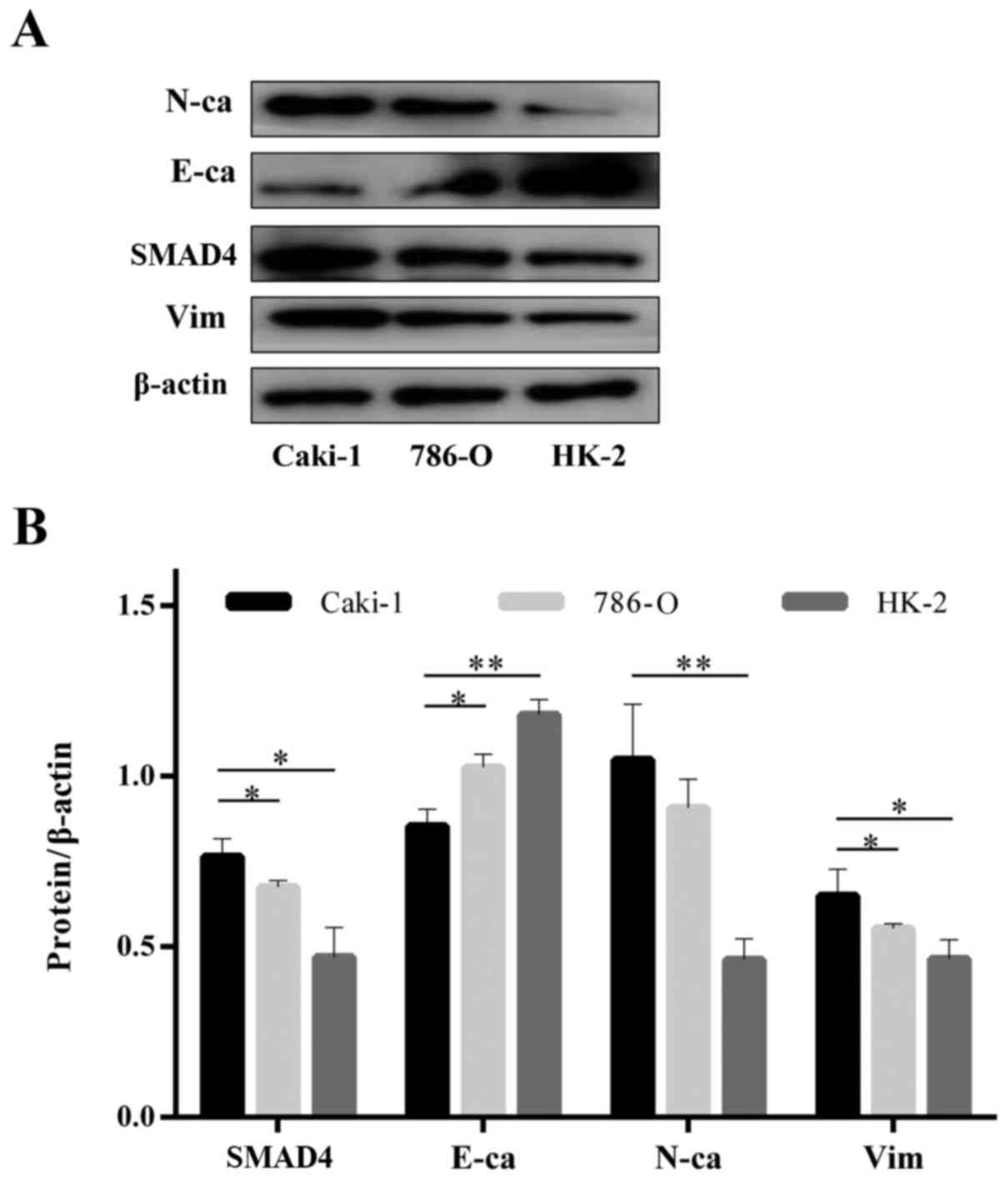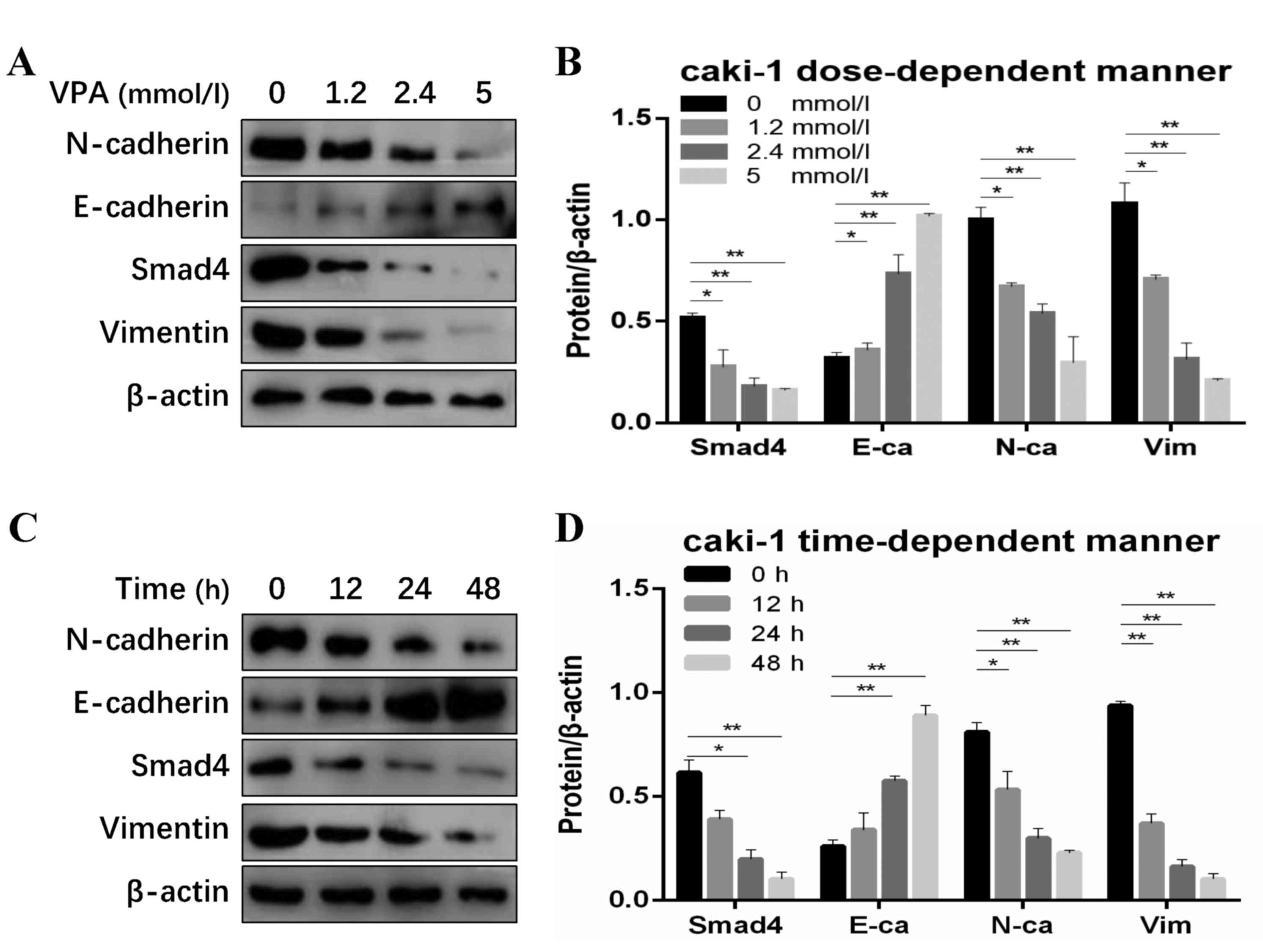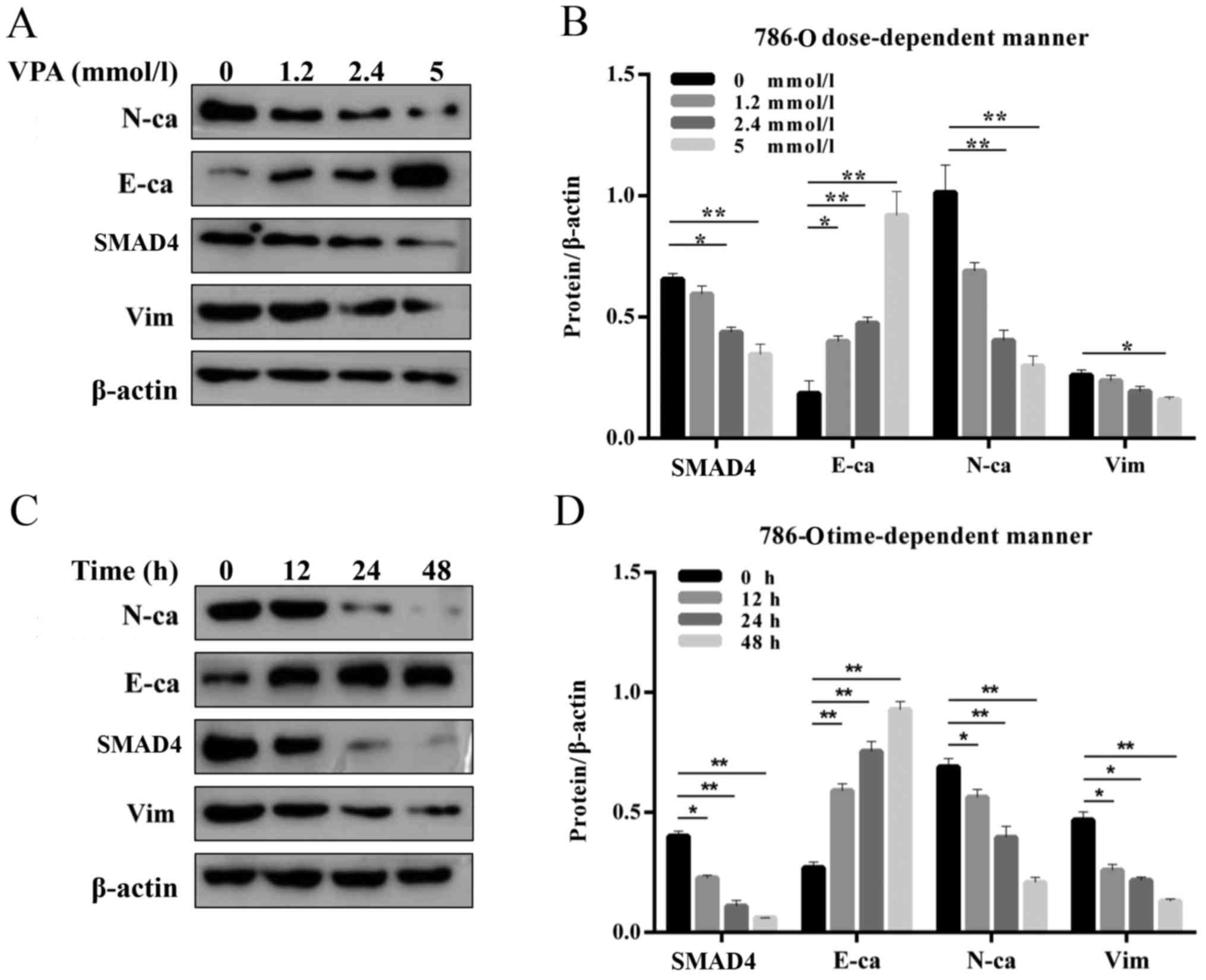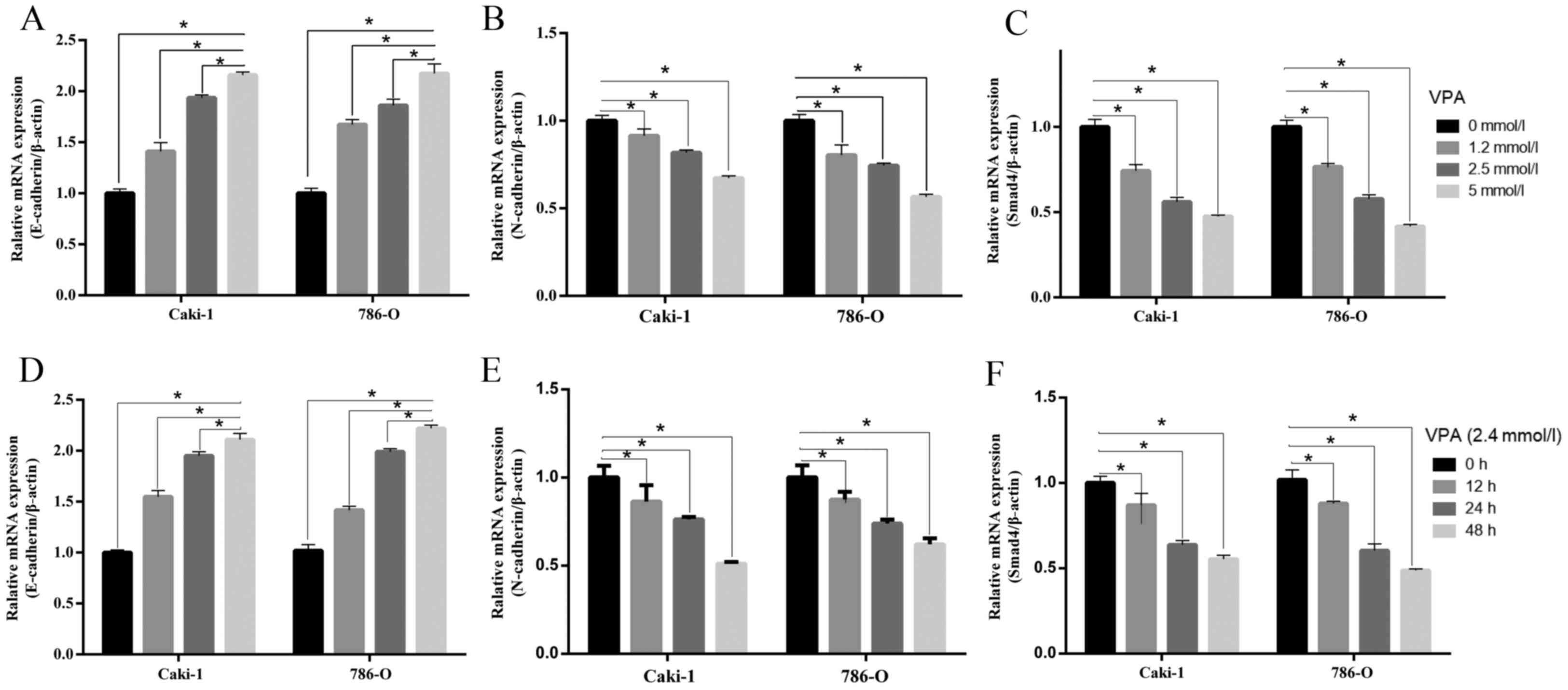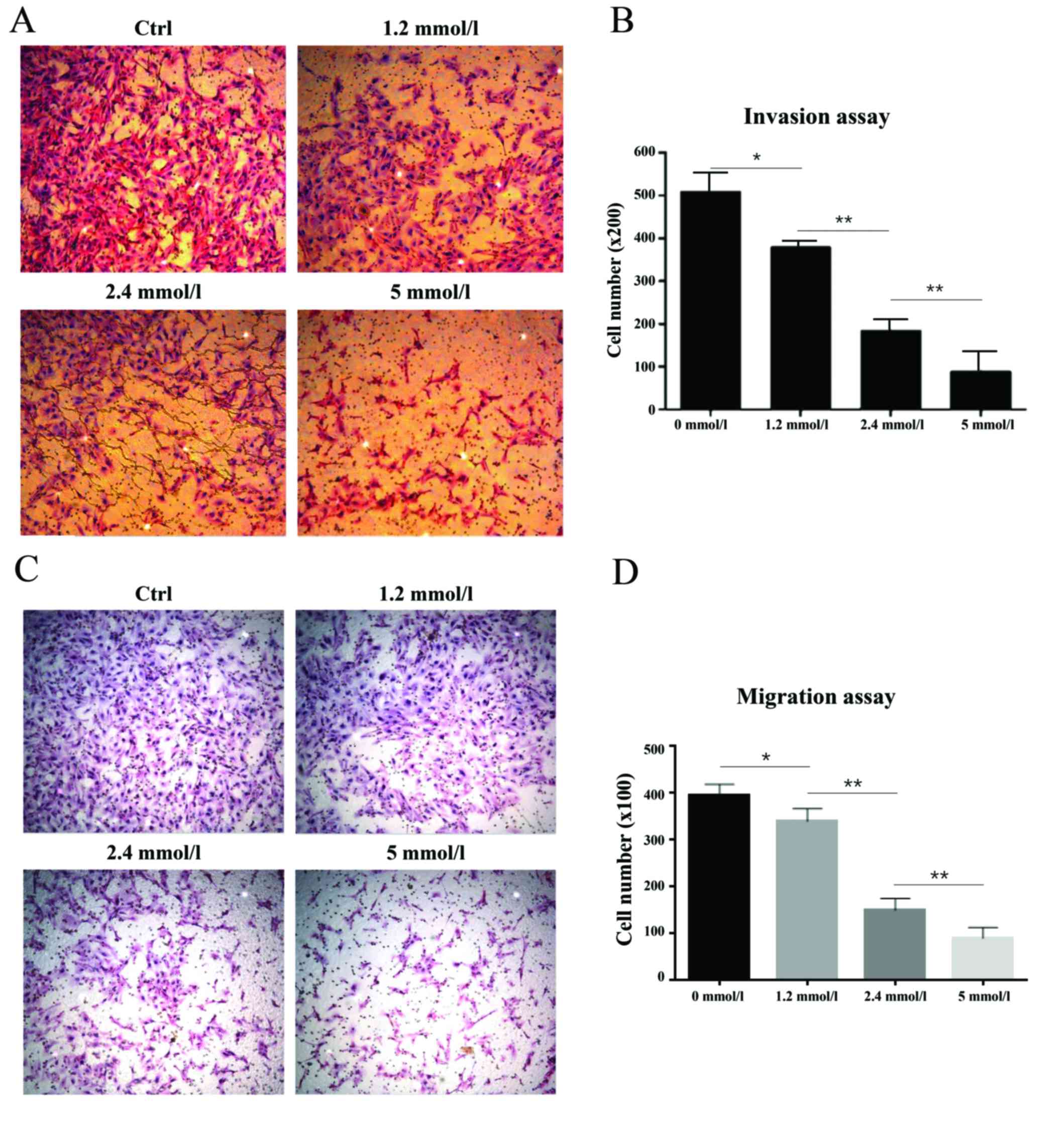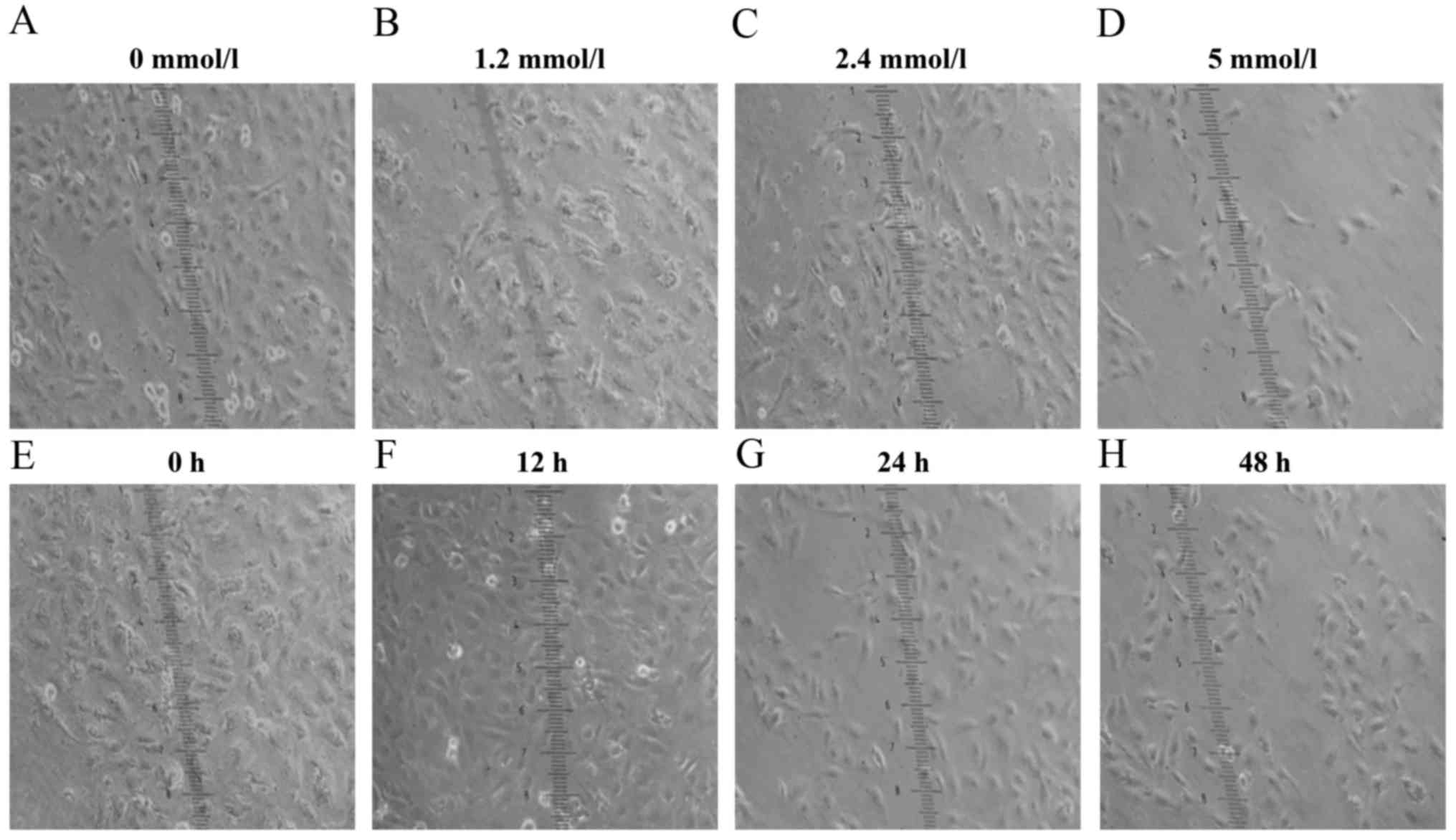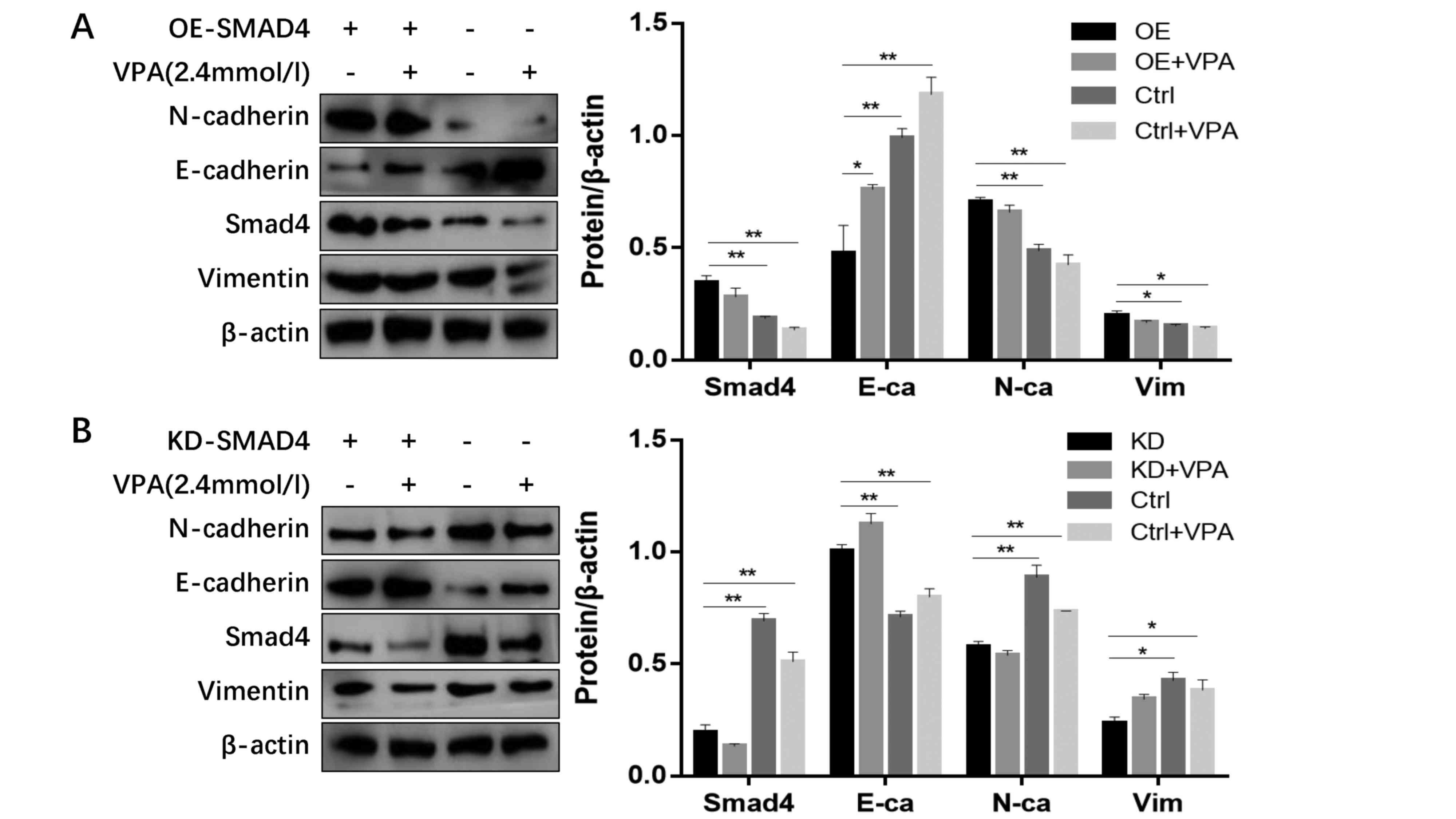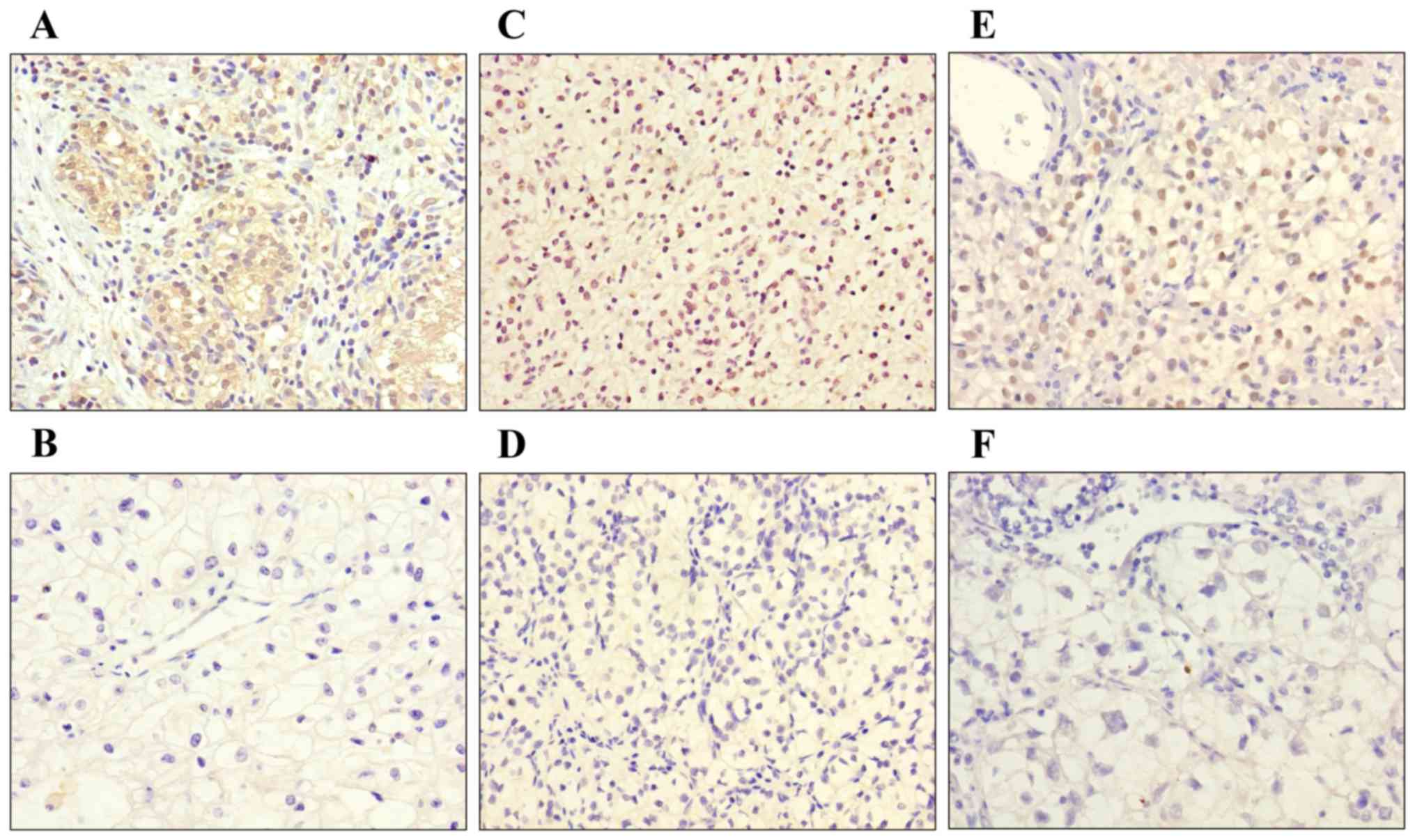|
1
|
Ni D, Ma X, Li HZ, Gao Y, Li XT, Zhang Y,
Ai Q, Zhang P, Song EL, Huang QB, et al: Downregulation of FOXO3a
promotes tumor metastasis and is associated with metastasis-free
survival of patients with clear cell renal cell carcinoma. Clin
Cancer Res. 20:1779–1790. 2014. View Article : Google Scholar : PubMed/NCBI
|
|
2
|
King SC, Pollack LA, Li J, King JB and
Master VA: Continued increase in incidence of renal cell carcinoma,
especially in young and high-grade disease: United States 2001 to
2010. J Urol. 191:1665–1670. 2014. View Article : Google Scholar : PubMed/NCBI
|
|
3
|
Ljungberg B, Campbell SC, Choi HY, Jacqmin
D, Lee JE, Weikert S and Kiemeney LA: The epidemiology of renal
cell carcinoma. Eur Urol. 60:615–621. 2011. View Article : Google Scholar : PubMed/NCBI
|
|
4
|
Novara G, Ficarra V, Antonelli A, Artibani
W, Bertini R, Carini M, Cunico S Cosciani, Imbimbo C, Longo N,
Martignoni G, et al: Validation of the 2009 TNM version in a large
multi-institutional cohort of patients treated for renal cell
carcinoma: Are further improvements needed? Eur Urol. 58:588–595.
2010. View Article : Google Scholar : PubMed/NCBI
|
|
5
|
Bertran E, Crosas-Molist E, Sancho P, Caja
L, Lopez-Luque J, Navarro E, Egea G, Lastra R, Serrano T, Ramos E
and Fabregat I: Overactivation of the TGF-α pathway confers a
mesenchymal-like phenotype and CXCR4-dependent migratory properties
to liver tumor cells. Hepatology. 58:2032–2044. 2013. View Article : Google Scholar : PubMed/NCBI
|
|
6
|
Kotiyal S and Bhattacharya S: Breast
cancer stem cells, EMT and therapeutic targets. Biochem Biophys Res
Commun. 453:112–116. 2014. View Article : Google Scholar : PubMed/NCBI
|
|
7
|
Isogaya K, Koinuma D, Tsutsumi S, Saito
RA, Miyazawa K, Aburatani H and Miyazono K: A Smad3 and
TTF-1/NKX2-1 complex regulates Smad4-independent gene expression.
Cell Res. 24:994–1008. 2014. View Article : Google Scholar : PubMed/NCBI
|
|
8
|
Qiao Y, Shiue CN, Zhu J, Zhuang T, Jonsson
P, Wright AP, Zhao C and Dahlman-Wright K: AP-1-mediated chromatin
looping regulates ZEB2 transcription: New insights into
TNFα-induced epithelial-mesenchymal transition in triple-negative
breast cancer. Oncotarget. 6:7804–7814. 2015. View Article : Google Scholar : PubMed/NCBI
|
|
9
|
Voorneveld PW, Kodach LL, Jacobs RJ, Liv
N, Zonnevylle AC, Hoogenboom JP, Biemond I, Verspaget HW, Hommes
DW, de Rooij K, et al: Loss of SMAD4 alters BMP signaling to
promote colorectal cancer cell metastasis via activation of Rho and
ROCK. Gastroenterology. 147:196–208.e13. 2014. View Article : Google Scholar : PubMed/NCBI
|
|
10
|
Wang L, Li Y, Yang X, Yuan H, Li X, Qi M,
Chang YW, Wang C, Fu W, Yang M, et al: ERG-SOX4 interaction
promotes epithelial-mesenchymal transition in prostate cancer
cells. Prostate. 74:647–658. 2014. View Article : Google Scholar : PubMed/NCBI
|
|
11
|
Chaudhry P, Fabi F, Singh M, Parent S,
Leblanc V and Asselin E: Prostate apoptosis response-4 mediates
TGF-β-induced epithelial-to-mesenchymal transition. Cell Death Dis.
5:e10442014. View Article : Google Scholar : PubMed/NCBI
|
|
12
|
Park JH, Lee C, Suh JH, Chae JY and Moon
KC: Nuclear expression of Smad proteins and its prognostic
significance in clear cell renal cell carcinoma. Hum Pathol.
44:2047–2054. 2013. View Article : Google Scholar : PubMed/NCBI
|
|
13
|
Gao MJ, Li X, Huang J, Gropp GM, Gjetvaj
B, Lindsay DL, Wei S, Coutu C, Chen Z, Wan XC, et al:
SCARECROW-LIKE15 interacts with HISTONE DEACETYLASE19 and is
essential for repressing the seed maturation programme. Nat Commun.
6:72432015. View Article : Google Scholar : PubMed/NCBI
|
|
14
|
Musselman CA, Lalonde ME, Côté J and
Kutateladze TG: Perceiving the epigenetic landscape through histone
readers. Nat Struct Mol Biol. 19:1218–1227. 2012. View Article : Google Scholar : PubMed/NCBI
|
|
15
|
Tassara M, Döhner K, Brossart P, Held G,
Götze K, Horst HA, Ringhoffer M, Köhne CH, Kremers S, Raghavachar
A, et al: Valproic acid in combination with all-trans retinoic acid
and intensive therapy for acute myeloid leukemia in older patients.
Blood. 123:4027–4036. 2014. View Article : Google Scholar : PubMed/NCBI
|
|
16
|
Ouyang DY, Xu LH, He XH, Zhang YT, Zeng
LH, Cai JY and Ren S: Autophagy is differentially induced in
prostate cancer LNCaP, DU145 and PC-3 cells via distinct splicing
profiles of ATG5. Autophagy. 9:20–32. 2013. View Article : Google Scholar : PubMed/NCBI
|
|
17
|
Zhang X, Zhang X, Huang T, Geng J, Liu M
and Zheng J: Combination of metformin and valproic acid
synergistically induces cell cycle arrest and apoptosis in clear
cell renal cell carcinoma. Int J Clin Exp Pathol. 8:2823–2828.
2015.PubMed/NCBI
|
|
18
|
Livak KJ and Schmittgen TD: Analysis of
relative gene expression data using real-time quantitative PCR and
the 2(-Delta Delta C(T)) method. Methods. 25:402–408. 2001.
View Article : Google Scholar : PubMed/NCBI
|
|
19
|
Lamouille S, Xu J and Derynck R: Molecular
mechanisms of epithelial-mesenchymal transition. Nat Rev Mol Cell
Biol. 15:178–196. 2014. View
Article : Google Scholar : PubMed/NCBI
|
|
20
|
Chen HN, Yuan K, Xie N, Wang K, Huang Z,
Chen Y, Dou Q, Wu M, Nice EC, Zhou ZG and Huang C: PDLIM1
stabilizes the e-cadherin/β-catenin complex to prevent
epithelial-mesenchymal transition and metastatic potential of
colorectal cancer cells. Cancer Res. 76:1122–1134. 2016. View Article : Google Scholar : PubMed/NCBI
|
|
21
|
Beier UH, Akimova T, Liu Y, Wang L and
Hancock WW: Histone/protein deacetylases control Foxp3 expression
and the heat shock response of T-regulatory cells. Curr Opin
Immunol. 23:670–678. 2011. View Article : Google Scholar : PubMed/NCBI
|
|
22
|
Advani A, Huang Q, Thai K, Advani SL,
White KE, Kelly DJ, Yuen DA, Connelly KA, Marsden PA and Gilbert
RE: Long-term administration of the histone deacetylase inhibitor
vorinostat attenuates renal injury in experimental diabetes through
an endothelial nitric oxide synthase-dependent mechanism. Am J
Pathol. 178:2205–2214. 2011. View Article : Google Scholar : PubMed/NCBI
|
|
23
|
Zibelman M, Wong YN, Devarajan K, Malizzia
L, Corrigan A, Olszanski AJ, Denlinger CS, Roethke SK, Tetzlaff CH
and Plimack ER: Phase I study of the mTOR inhibitor ridaforolimus
and the HDAC inhibitor vorinostat in advanced renal cell carcinoma
and other solid tumors. Invest New Drugs. 33:1040–1047. 2015.
View Article : Google Scholar : PubMed/NCBI
|
|
24
|
Ramakrishnan S and Pili R: Histone
deacetylase inhibitors and epigenetic modifications as a novel
strategy in renal cell carcinoma. Cancer J. 19:333–340. 2013.
View Article : Google Scholar : PubMed/NCBI
|
|
25
|
Chikamatsu K, Ishii H, Murata T, Sakakura
K, Shino M, Toyoda M, Takahashi K and Masuyama K: Alteration of
cancer stem cell-like phenotype by histone deacetylase inhibitors
in squamous cell carcinoma of the head and neck. Cancer Sci.
104:1468–1475. 2013. View Article : Google Scholar : PubMed/NCBI
|
|
26
|
Bruzzese F, Leone A, Rocco M, Carbone C,
Piro G, Caraglia M, Di Gennaro E and Budillon A: HDAC inhibitor
vorinostat enhances the antitumor effect of gefitinib in squamous
cell carcinoma of head and neck by modulating ErbB receptor
expression and reverting EMT. J Cell Physiol. 226:2378–2390. 2011.
View Article : Google Scholar : PubMed/NCBI
|
|
27
|
Lan X, Lu G, Yuan C, Mao S, Jiang W, Chen
Y, Jin X and Xia Q: Valproic acid (VPA) inhibits the
epithelial-mesenchymal transition in prostate carcinoma via the
dual suppression of SMAD4. J Cancer Res Clin Oncol. 142:177–185.
2016. View Article : Google Scholar : PubMed/NCBI
|
|
28
|
Shan Z, Feng-Nian R, Jie G and Ting Z:
Effects of valproic acid on proliferation, apoptosis, angiogenesis
and metastasis of ovarian cancer in vitro and in vivo. Asian Pac J
Cancer Prev. 13:3977–3982. 2012. View Article : Google Scholar : PubMed/NCBI
|
|
29
|
Xu Y, Xu D, Zhu SJ, Ye B, Dong JD, Zhang
YL and Zhang Y: Induction of apoptosis and autophagy in metastatic
thyroid cancer cells by valproic acid (VPA). Int J Clin Exp Pathol.
8:8291–8297. 2015.PubMed/NCBI
|
|
30
|
Bilen MA, Fu S, Falchook GS, Ng CS, Wheler
JJ, Abdelrahim M, Erguvan-Dogan B, Hong DS, Tsimberidou AM,
Kurzrock R and Naing A: Phase I trial of valproic acid and
lenalidomide in patients with advanced cancer. Cancer Chemother
Pharmacol. 75:869–874. 2015. View Article : Google Scholar : PubMed/NCBI
|
|
31
|
Byun SS, Kim FJ, Khandrika L, Kumar B,
Koul S, Wilson S and Koul HK: Differential effects of valproic acid
on growth, proliferation and metastasis in HTB5 and HTB9 bladder
cancer cell lines. Cancer Lett. 281:196–202. 2009. View Article : Google Scholar : PubMed/NCBI
|
|
32
|
Mishra VK, Wegwitz F, Kosinsky RL, Sen M,
Baumgartner R, Wulff T, Siveke JT, Schildhaus HU, Najafova Z, Kari
V, et al: Histone deacetylase class-I inhibition promotes
epithelial gene expression in pancreatic cancer cells in a BRD4-
and MYC-dependent manner. Nucleic Acids Res. Mar 27–2017.
View Article : Google Scholar
|
|
33
|
Kang Y, Ling J, Suzuki R, Roife D,
Chopin-Laly X, Truty MJ, Chatterjee D, Wang H, Thomas RM, Katz MH,
et al: SMAD4 regulates cell motility through transcription of
N-cadherin in human pancreatic ductal epithelium. PLoS One.
9:e1079482014. View Article : Google Scholar : PubMed/NCBI
|
|
34
|
Pan Y, Shu X, Sun L, Yu L, Sun L, Yang Z
and Ran Y: miR196a5p modulates gastric cancer stem cell
characteristics by targeting Smad4. Int J Oncol. 50:1965–1976.
2017. View Article : Google Scholar : PubMed/NCBI
|
|
35
|
Wu RS, Hong JJ, Wu JF, Yan S, Wu D, Liu N,
Liu QF, Wu QW, Xie YY, Liu YJ, et al: OVOL2 antagonizes TGF-β
signaling to regulate epithelial to mesenchymal transition during
mammary tumor metastasis. Oncotarget. 8:39401–39416.
2017.PubMed/NCBI
|
|
36
|
Xue J, Lin X, Chiu WT, Chen YH, Yu G, Liu
M, Feng XH, Sawaya R, Medema RH, Hung MC and Huang S: Sustained
activation of SMAD3/SMAD4 by FOXM1 promotes TGF-β-dependent cancer
metastasis. J Clin Invest. 124:564–579. 2014. View Article : Google Scholar : PubMed/NCBI
|
|
37
|
Hernanda PY, Chen K, Das AM, Sideras K,
Wang W, Li J, Cao W, Bots SJ, Kodach LL, de Man RA, et al: SMAD4
exerts a tumor-promoting role in hepatocellular carcinoma.
Oncogene. 34:5055–5068. 2015. View Article : Google Scholar : PubMed/NCBI
|
|
38
|
Noguchi S, Eitoku M, Moriya S, Kondo S,
Kiyosawa H, Watanabe T and Suganuma N: Regulation of gene
expression by sodium valproate in epithelial-to-mesenchymal
transition. Lung. 193:691–700. 2015. View Article : Google Scholar : PubMed/NCBI
|















